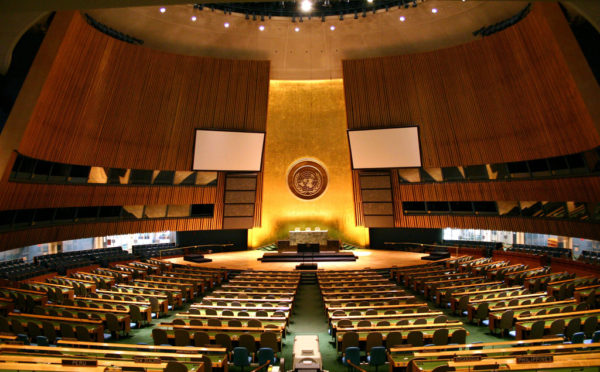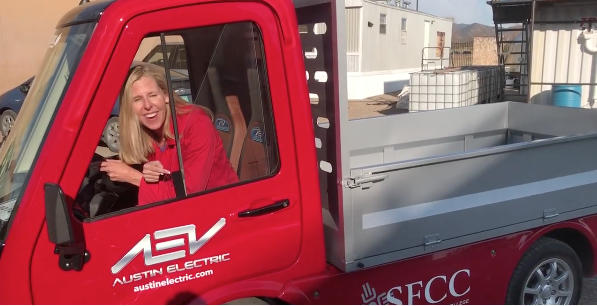Want to create a greener world that works for all people? One of the most important things you can do is vote with your dollars. Where you spend and invest your money is a powerful way of voting each day to support local communities, fair wages, and a healthy planet.
Here at Green America, we’ve helped educate and mobilize consumers to use their money for a greener world, and we’ve seen the results in the growth of organic foods, fair trade products, clean energy solutions, and community banks and credit unions, just to name a few. Voting with our dollars works.
Since women are disproportionately affected by climate change, it’s about time they get a bigger seat at the negotiating table. The Women and Gender Constituency, a group that works to ensure women’s rights are embedded in U.N. negotiations, is pushing for a new gender action plan set to be approved on Friday at the climate talks in Bonn, Germany. Little progress has been made since negotiators proposed a “gender balance” goal to boost female participation five years ago. (The U.N. process initially failed to include gender in its agenda.) A recent paper from the U.N. climate change secretariat shows that women made up 32 percent of conference delegates in 2015 and 2016, up only one percentage point from 2012.
Continue reading... →Natural disasters have a nasty habit of compounding previous, semi-manageable problems. We saw this with the Fukushima nuclear meltdown in Japan following a massive tsunami. Now we’re seeing it again, this time with Hurricane Maria in Puerto Rico. On top of food and medical shortages, experts are worried about several environmental issues exacerbated by the storm. While many of these issues — from poor industrial quality control to a general lack of clean, contained drinking water — already plagued Puerto Rico, the devastation of Maria has complicated matters. In many cases, it has made them a great deal worse.
Continue reading... →Just in time for Thanksgiving, a new digital calculator is taking the guesswork out of portion planning to help hosts reduce the massive amount of food, money and resources that go to waste around the holiday. The “Guest-imator” is the latest waste-busting consumer resource from the Ad Council and Natural Resources Defense Council’s Save The Food national public service campaign. “Thanksgiving is a time to be grateful, yet it’s often unintentionally wasteful as well,” said NRDC senior scientist Dana Gunders. “Hosts can have the best intentions, but planning a meal for a large group is still tricky. This calculator can help cooks prepare enough for turkey-cranberry sandwiches the day after the feast, but avoid a stockpile of past-due leftovers a week later.” Created pro bono by SapientRazorfish, the Guest-imator is designed to eliminate unnecessary over-purchasing, saving consumers money and preventing food waste before it starts.
Continue reading... →If you grew up in a neighborhood with lots of trees, chances are you had to put in plenty of hours each fall raking them all together, bagging them up, and then sending them off somewhere, most likely to the landfill. And you were probably told that the reason for this was not only so that the yard would look ‘tidier’ but also so that the leaves wouldn’t kill the grass. This myth has probably sold more rakes and bags than anything else, and while raking may have enriched the pockets of neighborhood kids (assuming you got paid to rake leaves), the practice actually removes important nutrients from the yard, which homeowners then usually repurchase, in another format, in a bag or jug of fertilizer from the local garden center.
Continue reading... →The fashion industry receives a lot of criticism for a lack of eco-friendly sourcing and production methods. Girlfriend Collective (GC) has tackled this issue head-on by creating an eco-friendly line of activewear clothing. GC was founded to offer people a completely transparent clothing line. The Seattle based company is built from top to bottom with sustainability initiatives in mind. All of their packaging is recycled and recyclable, and they make most of their clothing with post-consumer products.
Continue reading... →After decades of tirelessly championing women’s rights, Gloria Steinem’s legacy is finally headed to the screen. Oscar winner Julianne Moore, who won Best Actress for 2015’s Still Alice, will take on the role of Steinem in a biopic based on the activist’s recent memoir, My Life On The Road. The coming-of-age story will chronicle Steinem’s experiences traveling to advocate for women’s equality over the years. According to Deadline, Julie Taymor (Frida, Across the Universe) will direct from a script written by playwright Sarah Ruhl.
Continue reading... →Any to-go beverage you’ve recently gotten likely came with the traditional plastic straw poking out of the lid. You probably quickly forgot about the straw after its usefulness ended. We’re busy people, and even the most well-intentioned environmentalists among us have been handed a plastic straw and taken it without question, maybe in a hurry to get where she’s going. She didn’t ask for the straw, but she got one anyway, and now it seems like a waste to not use it, so she does. Here’s the problem: those forgotten weightless funnels of plastic linger for hundreds of years, so every straw you’ve ever grabbed or been handed for your entire life still exists somewhere. In fact, Americans use 500 million straws every single day. Even as plastic breaks down, it just becomes smaller and smaller fragments of plastic and never fully disintegrates, so these particles can wash out to sea and travel thousands of miles away, even making it into the stomachs of penguins, fish, or other wildlife.
Continue reading... →Women of Green founder Carolyn Parrs got to drive an Austin Electric Vehicle recently! These all-electric cars and pick-up trucks offer a green transportation option to businesses, institutions, non-profit organizations and more.
Continue reading... →Now, the movement that began at Standing Rock has gone global, since much of the DAPL funding came from overseas banks. Some European banks such as BNP Paribas have taken steps to stop funding fossil fuel projects that trample Native peoples’ rights. Others such as Norway’s DNB and ING have done some divesting. Last week, a delegation of Indigenous women returned from a trip to Europe where they met with leaders of financial institutions in Norway, Switzerland, and Germany, the “home bases for several of the world’s largest financial and insurance institutions supporting dangerous extraction developments,” according to the news release. The delegation was organized by Indigenous women leaders in partnership with the Women’s Earth and Climate Action Network.
Continue reading... →








